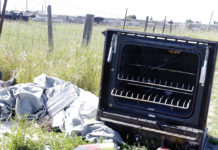
In 2014 Elizabeth Hoover, associate professor in Environmental Science, Policy, and Management at UC Berkeley, set out on a road trip across the U.S.
Hoover covered 20,000 miles over four months, visiting 29 different Indigenous communities and asking everyone she met one question: How do they define food sovereignty?
Food sovereignty is a growing movement that takes the ideas of food justice and food security to a new level. In general terms, it is “The right of peoples to healthy, culturally-appropriate food produced through ecologically sound and sustainable methods, and the right to define their own food and agriculture systems.”
Hoover’s long-running project, “From Garden Warriors to Good Seeds: The Native American Fight for Food & Seed Sovereignty” has set out to research and address food sovereignty and environmental justice for Native American communities. She explained her work in her March 14 keynote speech at the Ecological Farming Association’s annual conference (Eco Farm), which has been taking place this week via Zoom.
“With food sovereignty … We don’t just want equality within the current system, we want our own system,” Hoover said. “We don’t want an equal piece of the pie, we want our own pie. How can communities be better at deciding for themselves how they’re procuring and producing food? Indigenous communities insist on recognizing the social, cultural and economic relationships that underline food sharing, which needs to be nurtured.”
Hoover explained how, over the course of the past 500 years, Indigenous communities across the country have had their food systems stripped away. From scorched earth military tactics and intentional destruction of buffalo herds, to land theft and relocation. She touched upon the Dawes Act of 1887, which regulated land rights on tribal communities, as well as the boarding schools that remained in use through the 1950s, where native youth were taken from their families and distanced from their own cultures.
“And the Bureau of Indian Affairs really promoted Western farming methods and seeds, even among communities where people had already been farming for thousands of years,” Hoover said. “All of this interrupted traditional food systems.”
The modern food sovereignty movement addresses how communities can take back these aspects of their culture, but it also contends with modern challenges such as climate change, cross-pollination with GMO crops, lack of access to seeds, land and tools, a hemorrhaging economy and growing health inequalities.
“Diabetes is now the seventh leading cause of death for native people,” Hoover reported. “That is a 249% greater rate than other Americans.”
The ongoing pandemic has also thrown a wrench into native health and food systems, including the decline of many feeding programs on reservations across the country.
“[Covid] highlighted a lot of the challenges that native people were already facing around food,” Hoover said.
Seed sovereignty, in particular, is a large part of Hoover’s work—that is, “The rights of farmers to save, exchange and use farm-raised seeds, and having that be valued over plant breeders, chemical farms and intellectual property rights.”
“These seeds are such an important part of this movement,” Hoover said. “Some seeds are passed down through families, some come from seed banks … It establishes this cultural connection to planting that you don’t really have when you’re just planting cucumbers or tomatoes out of a catalog. There’s also a ceremonial context … there are ceremonies that are associated specifically with planting seeds.”
During her presentation, Hoover highlighted a number of native chefs and their restaurants in the Bay Area.
“You can grow food, but how do you get people excited about eating it? Native chefs have dedicated their lives to educating people about food, and getting them excited about native history and culture through preparing it,” Hoover said. “These people are proud of their cultures and communities, and want to preserve these foods and techniques.”
The fight for food sovereignty has gained traction over the years, growing from local and regional into national and even international movements. Anti-oil pipeline activists have dovetailed off of it, teaming up with farmers and landowners to plant native seeds along proposed pipeline routes.
“You can’t have access to safe, healthy food if you have a leaky pipeline going through your territory,” Hoover stated.
There is plenty of work to be done within the food sovereignty movement, Hoover admitted, and advocates hope that others will join in to help address all of the issues it brings forth.
“How do you grow healthy food to improve health statistics, but also the kind of food that nurtures spiritual and cultural health?” Hoover postulated. “To what extent do individuals have agency over what they are eating … [and] how do you ensure the whole community has access to enough food? And what can tribal governments be doing to support this? We need to be thinking of food sovereignty as an ongoing process, a method, and not a final destination.”
Learn more about Hoover’s work at gardenwarriorsgoodseeds.com. EcoFarm’s virtual conference wraps up this weekend, but in-person field days will be held in April and June.









